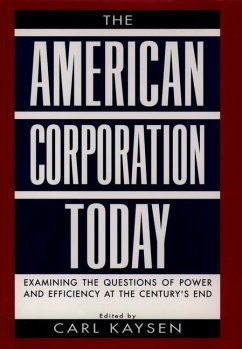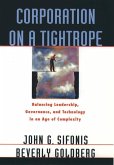In The American Corporation Today, Carl Kaysen and other leading students of business and markets from around the country provide a much-needed analysis of American corporate life at the end of the century. Here is the American corporation from every angle - its postwar history, its relation to the law, its financing, its impact on technological innovation, its role as employer and as political force, and much more. The contributors - all of whom are recognized experts in their fields - not only tackle many of the same key areas that the contributors to Mason's classic study looked at, but they also illuminate issues that have only arisen in recent years. For instance, Raymond Vernon describes the increasing globalization of American business, where the net income from operations outside the U.S. is now nearly half of that from domestic operations (as opposed to one-tenth in the 1950s). James Q. Wilson traces how the corporation has become a full-time political actor, showing how it reinvented its political strategy and tactics in the 1960s in the face of a wave of new consumer, environmental, and worker health legislation. Gregory Acs and Eugene Steuerle show how the corporation promotes the commonweal, acting as agent for the employee in purchasing pension, health, and other welfare benefit plans, while Lester Thurow casts a critical eye at the decline of median real wages of American males over the last twenty years (never before have a majority of American workers suffered real wage reductions while the real per capita gross domestic product was increasing). In other pieces, corporate finance experts Charles Calomiris and Carlos Ramirez advocate removing legal constraints onfinancial institutions that prevent them from providing the full range of business financing from short-term debt to equity, Michael Useem looks at the rise of education and training as a vexing corporate issue, and Barbara Bergmann discusses the increasingly diverse work force, arguing that ending bias is in the corporation's best interest. And finally Neil Harris provides a fascinating discussion of architecture, exploring how companies have become the principle patrons of important architecture since the 1950s.








